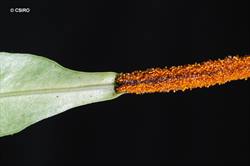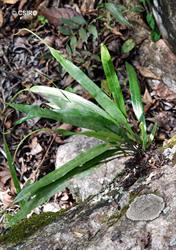Polypodiaceae
Australian Tropical Ferns and Lycophytes - Online edition
Lepisorus mucronatus



Lepisorus mucronatus (Fée) Li Wang
Link to Australian Plant Name Index for publication details and synonyms: https://id.biodiversity.org.au/name/apni/239534
Rhizome short-creeping; rhizome scales triangular to broadly triangular, 3–7 mm long, 0.6–2 mm wide, dark brown to black, uniform in colour, clathrate; margins dentate. Fronds articulated to the rhizome, closely spaced; stipe bases embedded in a mass of hairy roots. Stipe 0.7–7.5 cm long. Lamina simple and entire, 8–53 cm long, 5–30 mm wide excluding the narrow apical fertile portion, narrowed ±evenly to apex and base, constricted at junction with fertile portion; veins obscurely reticulate; fertile portion 2–25 cm long, 2–4 mm wide; paraphyses with laterally affixed or peltate blades, the latter round, 10–65 µm diam., brownish to black, with thick-walled cells. Spores monolete, rugulose, 60–82.5 µm long, 27.5–45 µm wide.
Iron Range NE QLD to Evans Head NSW. Also widespread in Asia and Pacific Islands.
Epiphytic or lithophytic in vine forest in a wide variety of habitats from coastal beach scrubs to upper montane cloud forest and inland seasonal vine forest on rock piles.
A commonly cultivated ornamental fern. This species may become a weed in greenhouse situations.
Easy to cultivate in a container or as an epiphyte in a tropical garden. May be invasive in a moist greenhouse situation.
Field AR, Quinn CJ, Zich FA (2022) Australian Tropical Ferns and Lycophytes. apps.lucidcentral.org/fern/text/intro/index.htm (accessed online INSERT DATE).
Field AR, Quinn CJ, Zich FA (2022) ‘Platycerium superbum’, in Australian Tropical Ferns and Lycophytes. apps.lucidcentral.org/fern/text/entities/platycerium_superbum.htm (accessed online INSERT DATE).







